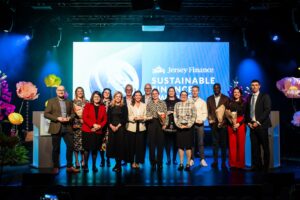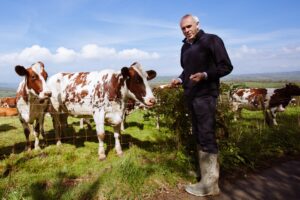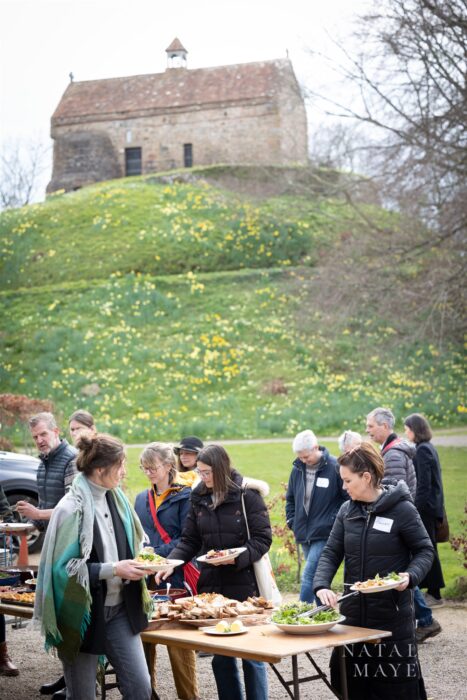
By Alasdair Crosby
WHAT is a ‘luminary’? Mr Google – that fount of all knowledge – says a luminary is ‘a person who inspires or influences others, especially one prominent in a particular sphere.’
‘Luminaries’ was the title of a conference – or rather, ‘gathering’ – held at La Hougue Bie recently, aimed at finding a ‘shared future and bridging perspectives’ between two very disparate local industries: finance and agriculture.
Ne’er the twain shall meet? Well, yes, they might well do so, if Hypha Consulting are successful in their purpose of building bridges between the two. Hypha is the creation of Taylor Smythe and India Hamilton, who have already created the annual ‘Regen Gathering’ event, about innovative food and farming approaches, held for the past two years in September.
And ‘sustainability’, ‘innovative’ and ‘regeneration’ were words that were frequently used throughout the day-long Luminaries event.
In Taylor’s words: ‘The Luminaries Gathering was a unique conference at the intersection of regenerative finance and inner development. We explored tools for inner work that might help business leaders respond to these changing times, while also analysing how finance might connect with land and agriculture to support the transition to regenerative food systems.
‘Our quest is reconnection. Since our first Regen Gathering in 2023, we have been building bridges across food, farming, and health. Now, we are expanding these circles to include the finance ecosystem. Our aim is to create nourishing spaces that inspire and foster deeper connections—with ourselves, with one another, and with the natural landscapes, of which we are all part.’
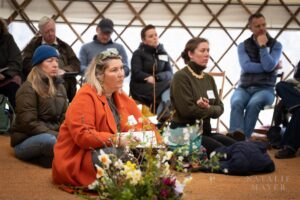
Hypha Consulting hope to build on the momentum of the Sustainable Finance Summit, and to plant seeds for reimagining the systemic potential of Jersey’s finance system.
This 2025 Luminaries Gathering is the first of its kind, and so admittedly experimental. It brought together leaders of both finance and agriculture in the Island, as well as conference speakers from the UK, for a day of ‘practice, connection, and inspiration’, and learning how nature and human innovation intersect, and how this might inform the shift away from traditional economic models.
The day did not fit the mould of any previous business conference that I have attended. Early birds started the day by observing the shaft of dawn sunlight in La Hougue Bie passageway – this was the last of three days of the Equinox season. Your correspondent was not an early bird, but, together with most of the other participants, joined the conference at 8am, which seemed quite early enough on a cloudy morning when the ‘sunbeam show’ was not so awe-inspiring as it had been in dawn’s early light of the day before.
Afterwards, not the frenetic intemperance of over-eager networking, as in most business gatherings, but an instruction to walk slowly and in silence up the pathway to the chapels a-top the mound, to listen to some haunting flute playing, and then process down again, leaving a space between the person in front and behind in the procession, and being asked to think of one’s connection to the ground underfoot.
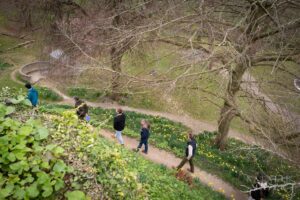
Later in the morning, once the conference had got under way, participants were invited to form into pairs and to do an exercise consisting of silently gazing into the other person’s eyes for three minutes and then spend three minutes receiving a gaze from one’s paired partner. Not quite sure what that was supposed to achieve, and in any case any potential result of the exercise for me was rather spoiled by a joint effort of trying to stifle an incipient fit of giggles.
A further exercise was to form into groups of three, and each member, without any preparation or forethought, had to discuss ‘the nature of mankind’ for six minutes. Your correspondent managed 2½ minutes before breaking down to a halt.
Leading these exercises was a young Norwegian called Caroline Hargreaves. Her name didn’t sound terribly Norwegian, I suggested to her in an interval in the proceedings. She told me that her ancestor was James Hargreaves, the 18th Century Lancashire inventor of the Spinning Jenny, the multi-spindle spinning frame that transformed the cloth industry and heralded Britain’s Industrial Revolution. His son moved to Norway to introduce his father’s invention there, and then settled there, kick-starting the Industrial Revolution in Norway. Now, his descendant, Caroline, joked that she was putting into reverse gear the revolution that her ancestor had begun, together with the mechanistic factory system and industrialisation that it had spawned.
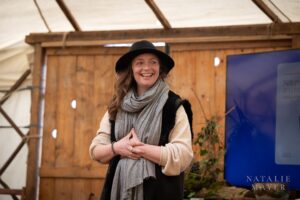
She had a point – mankind does not seem to be too happy in the modern, industrial system that it has created, and neither does the Earth seem too happy to have that system thrust upon her. That was a point made by the first speaker of the day, John Fullerton, speaking via a link with the USA that had been recorded and edited by India Hamilton.
Mr Fullerton is an American economist, investor, and philosopher, the author of the 2015 booklet, Regenerative Capitalism: How Universal Patterns and Principles Will Shape the New Economy. In 2010, he created the Capital Institute, a think-tank on regenerative economic theory, an attempt to imagine economics and finance in service to life.
He said: ‘We deal with the consequences of managing our economy as if it is a machine,’ he said. ‘The symptoms [of this] are things we call climate change, inequality, desertification… the list goes on and on.
‘Our human economy is a living system, which is profoundly different to a machine. A living system is complex, whereas a machine is complicated. One of the deep root causes of our current challenges, that we have now labelled “the polycrisis”, is that economics – and its stepchild, finance – have been developed on a Newtonian, mechanistic foundation.
‘So the whole theoretical foundation of this discipline has been built on a mechanistic understanding, an idea that economics and business comprise a machine, and we can optimise this machine to generate growth and wealth. That works well with a machine, but with a complex living system, it always fails.
‘Some of the latest physics is foundational to this understanding of how life works.
The complexity of life is not reducible to mathematical laws. The hopeful promise of the regenerative paradigm is that the magic of life emerges into new forms. Evolution continues as a process that adapts and adjusts to change.’
He quoted the famous saying of the late maverick thinker, Kenneth Boulding: ‘Anyone who says that exponential growth can go on for ever on a finite planet is either a madman or an economist.’
In short, there are, indeed, limits to growth.
Other luminaries during the day included Jenny Scott, who had worked for the Bank of England during the 2008 financial crisis. Tamara Giltsoff spoke about her journey to land-based regeneration and designing the first regenerative loan scheme between farmers and investors.
Jess McQuabe from the World Wildlife Fund UK has been tasked with innovating theory on how people and farmers can drive wildlife outcomes. Mara Benjamin is developing a loan scheme to regenerate the wool system in the Lake District.
Speaking after the event, Taylor said: ‘The calibre of speakers and attendees was remarkable. The challenge now is to turn awareness into meaningful action. Our community – united by a shared commitment to transitioning from a commodity-driven economy to one that nourishes people, place and purpose – has the potential to drive real progress, especially by aligning finance and agriculture.
‘Jersey already has a strong foundation through the Rural Economic Framework and other initiatives. However, the future is not built on policy alone, but by participation.
‘To build on the momentum of the Sustainable Finance Summit, Regen Gathering, and Luminaries Gathering, we believe the next step is focusing on Jersey-specific projects that can create real impact.’
It was interesting to see a wide range of attendees that I suspect would not normally come together for any sort of conference. Representatives from the finance sector, included sponsors Alex Picot and Evelyn Partners, and financiers rubbed shoulders with dairy farmers and potato growers.
As one finance industry participant shared afterwards: ‘I left the event reflecting on how we can play a tangible role in driving real change. What projects in Jersey need further funding? What educational initiatives could help shift mindsets and behaviours within our community? And what new projects should we consider starting?’
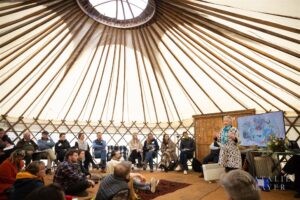
Taylor said that this was just the first, experimental meeting and that emerging opportunities might include further Luminary meetings leading up to the Regen Gathering in September, focussing on innovative ways to build a regenerative food system in Jersey through finance and investment.
The forthcoming Regen Gathering might be a platform for promoting a grant for new or early-stage regenerative businesses, and to explore opportunities for the finance sector to support local rural policy, as well as establishing ways of supporting new food and farm businesses, from both a regulatory and financial perspective.
‘We want to showcase existing projects through the lens of regenerative potential linking from ecosystem regeneration to human health, and to refine future gatherings and make them even more effective.
‘It’s clear: we are not just witnesses to change — we are its architects.’
First published in the Jersey Evening Post, and reprinted with their kind permission


